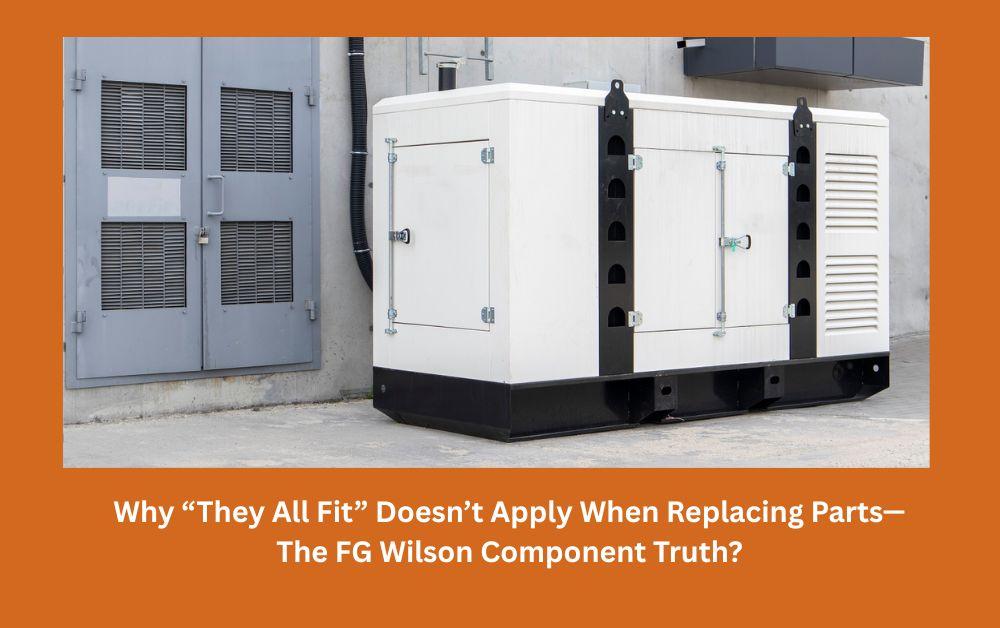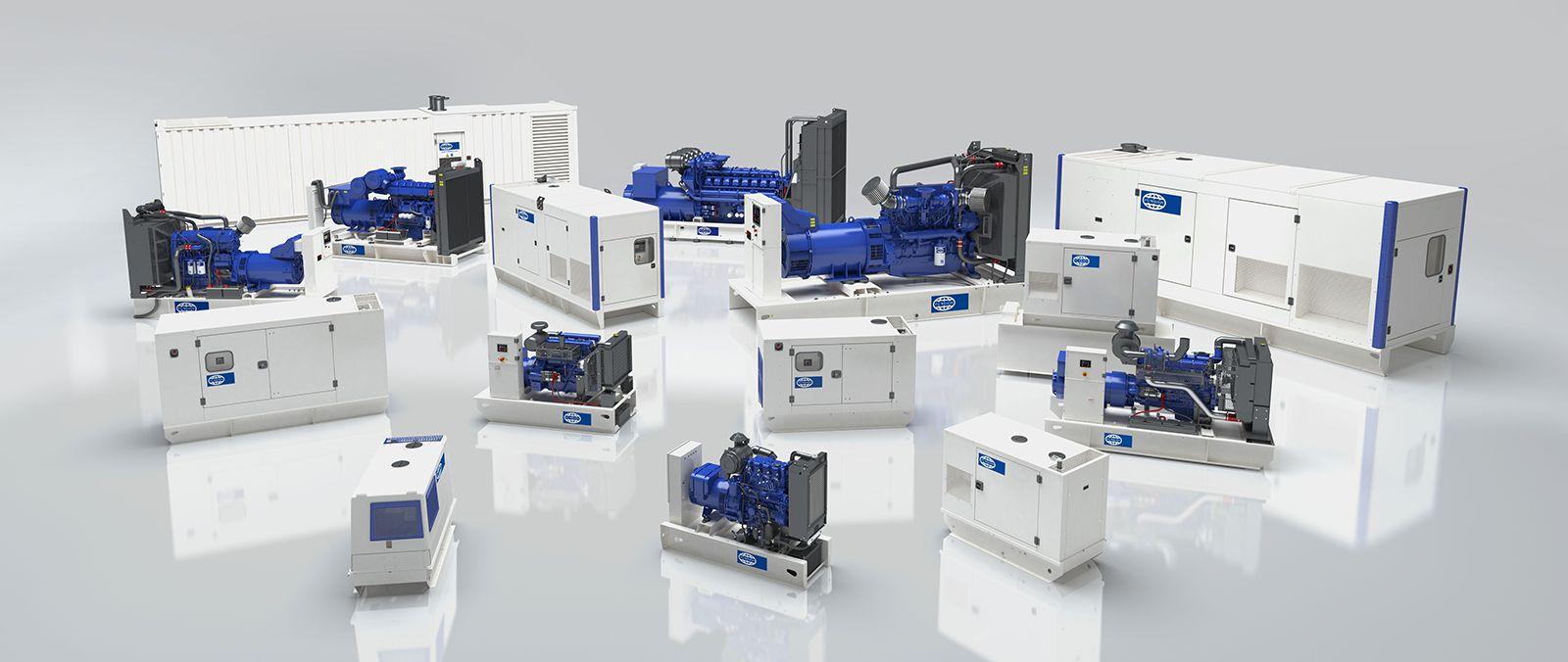Why “They All Fit” Doesn’t Apply When Replacing Parts—The FG Wilson Component Truth?

Introduction
In the world of power generation, downtime isn’t just inconvenient—it can be costly and even dangerous. Generators power hospitals, data centers, factories, and countless critical services that must run without interruption. When a machine breaks down or requires maintenance, the temptation to cut costs often leads businesses to purchase cheaper, seemingly compatible parts. After all, if a component fits, surely it works the same—right?
The reality, however, is far more complex. Just because a part physically fits into a generator doesn’t mean it performs as expected, nor does it guarantee long-term reliability. That’s where the discussion about genuine versus aftermarket components becomes essential. And nowhere is this more evident than with FG Wilson Genuine Parts, which are engineered with precision and tested for real-world reliability.
This article explores why the “they all fit” mindset can put your operations at risk, what makes authentic FG Wilson components different, and how making the right choice today can save money, time, and headaches tomorrow.
The Myth of “One Size Fits All” in Power Generation
Why Fit Doesn’t Equal Function
A replacement gear, belt, or filter might look identical to its genuine counterpart, but its internal specifications could vary significantly. Even the smallest differences—such as material density, heat resistance, or micron filtration capacity—can impact how a generator runs. Over time, those micro-differences accumulate, causing inefficiencies, higher fuel consumption, or even catastrophic failure.
Generators are precision machines. They depend on components designed for exact tolerances. A “good enough” part may keep your generator running today, but it could shorten its lifespan dramatically.
Short-Term Savings vs. Long-Term Costs
Aftermarket suppliers often lure buyers with lower prices, but those savings vanish when replacement parts fail prematurely. Consider the ripple effect:
-
A faulty filter could cause engine wear.
-
An unreliable sensor might lead to overheating.
-
A mismatched bearing could damage the crankshaft.
The end result? Downtime, expensive repairs, and, in severe cases, replacement of the entire generator.

Understanding the FG Wilson Component Truth
Built for Precision and Reliability
Unlike generic replacements, FG Wilson components are designed to work seamlessly with the brand’s generators. Every part—whether it’s a filter, belt, or engine element—undergoes rigorous quality testing to meet international standards. The emphasis is not just on function but on ensuring the part integrates perfectly into the overall system.
The First Mention of the Target Keyword
Choosing FG Wilson Genuine Parts ensures you’re not merely buying a component that “fits.” You’re investing in a solution engineered to preserve efficiency, reliability, and safety. These parts are produced under strict quality control, guaranteeing that every element performs to its intended standard.
Why Cutting Corners Doesn’t Work
Compromising on Safety
Generators often serve critical functions in hospitals, emergency response centers, and industrial facilities. If a compromised part fails during a crisis, lives and livelihoods could be at stake. The “they all fit” mindset disregards the safety risks that come with non-authentic replacements.
Downtime and Operational Risks
When generators stop working, operations halt. A few hours of downtime can cost businesses thousands, sometimes millions, depending on the industry. Using low-quality or ill-fitting parts drastically increases the risk of unexpected breakdowns, undermining operational continuity.
The Science Behind Genuine Components
Engineering and Testing
Genuine parts are not only designed for fit but also tested under real-world conditions, including extreme temperatures, heavy loads, and prolonged operation. This level of testing ensures that parts don’t just work in theory—they work in practice.
Materials and Manufacturing
High-quality alloys, advanced coatings, and precise machining techniques give genuine components the durability they need to withstand years of use. By contrast, counterfeit or generic parts often cut corners on material quality to reduce costs.
The Second Mention of the Target Keyword
Businesses that rely on power stability know that FG Wilson Genuine Parts are not just a brand recommendation—they are a necessity. They ensure your generator runs as designed, safeguarding both your investment and your peace of mind.
Common Parts That Get Replaced—and Why Authenticity Matters
Filters
Air, fuel, and oil filters protect engines from contaminants. A poor-quality filter may allow harmful particles to enter, leading to engine wear and costly repairs.
Belts and Hoses
These parts may look interchangeable, but variations in elasticity and heat resistance can affect performance. Genuine belts and hoses are tested to withstand operational stress.
Sensors and Electronics
With generators becoming increasingly digital, sensors play a vital role. An inaccurate reading from a generic sensor could trigger false alarms or fail to detect real problems.
Engine Components
From pistons to gaskets, every engine part must work harmoniously. A single substandard component can create a domino effect of failures.
Practical Advice for Buyers
Work With Authorized Dealers
Always source parts through authorized FG Wilson distributors. They provide assurance of authenticity and can offer guidance on maintenance best practices.
Verify Serial Numbers and Packaging
Counterfeit parts are a growing issue. Genuine parts typically come with branded packaging, serial numbers, and authentication features.
Look Beyond Price Tags
When evaluating parts, consider total cost of ownership, not just upfront price. A cheaper component that fails quickly ends up costing more in replacements, repairs, and downtime.
Case Study: When Fit Wasn’t Enough
A mid-sized manufacturing firm in East Africa once opted for aftermarket filters to save costs. At first, everything seemed fine. But within months, machines began experiencing fuel inefficiency and unexpected shutdowns. The root cause was traced back to poor-quality filters allowing contaminants into the system.
After switching back to genuine parts, downtime decreased, and the company’s annual maintenance costs dropped significantly. The lesson was clear: fit is not function.
The Human Element
Peace of Mind for Operators
Generator operators already juggle multiple responsibilities. Knowing that the machine runs on authentic components reduces stress and increases confidence in system reliability.
Building a Culture of Quality
Organizations that prioritize genuine parts foster a culture of quality. This mindset often extends beyond generators, improving standards across other operational areas.
The Bigger Picture: Sustainability and Responsibility
Environmental Impact
Poor-quality parts that fail prematurely generate more waste. By contrast, genuine parts last longer, reducing the frequency of replacements and minimizing environmental impact.
Corporate Reputation
For businesses, reputation matters. Customers and stakeholders expect reliability. A power outage caused by inferior parts can damage trust, whereas consistent performance reinforces credibility.
Conclusion
The phrase “they all fit” is dangerously misleading when it comes to generators. A part that physically fits into place doesn’t guarantee performance, reliability, or safety. In fact, choosing the wrong components often leads to higher costs, unnecessary downtime, and avoidable risks.
The FG Wilson Component Truth is straightforward: only genuine parts are designed to meet the exacting standards required for long-term generator performance. By choosing wisely today, businesses and individuals secure not only their power supply but also their reputation, safety, and bottom line.
When the stakes are this high, “fit” alone is never enough—what matters is function, quality, and authenticity.
- Art
- Causes
- Crafts
- Dance
- Drinks
- Film
- Fitness
- Food
- Games
- Gardening
- Health
- Home
- Literature
- Music
- Networking
- Other
- Party
- Religion
- Shopping
- Sports
- Theater
- Wellness


